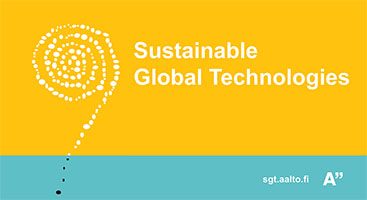WAT-E2060 - Sustainable Built Environment D, Lecture, 24.10.2022-12.12.2022
This course space end date is set to 12.12.2022 Search Courses: WAT-E2060
Topic outline
-

Welcome to WAT-E2060 Sustainable Built Environment!
This course will be arranged both f2f and online. The links to Course Zoom and Course Miro can be found under the course schedule below.Contact: Anahita Rashidfarokhi and Anise McCrone (firstname.lastname@aalto.fi)
- PERIOD II: 24.10 - 07.12
- Mondays & Wednesdays at 9-12. We start at 9:00 sharp!
- Prerequisite: WAT-E3020 State of the world and development
- Live lectures will be held in Q201 (Väre)
- 5 ECTS = 135h
Note: there is a limited number of students that can be accepted in the course (60 students)***Sustainable Built Environment is part of the Sustainable Global Technologies Programme (SGT) and World in Transition (WiT) Minor.
sgt.aalto.fi || Instagram: aalto_sgt || WiT Minor in Into
COURSE SCHEDULE 2022
WEEK 1: Working methods
Monday 24 October | 9-12 (CONTACT)
"Introduction: Definitions, Values and Working Methods" Matleena Muhonen, Academic coordinator, Aalto EDUCase network & Julia Sundman, Doctoral candidate, Aalto Department of Built Environment
Wednesday 26 October | 9-12 (CONTACT)
"Ukraine responses" 15 min report by Kristjana Adalgeirsdottir, Swiss Red Cross Shelter Delegate"Futures Studies Methods" Amos Taylor, Project Researcher, Finland Futures Research Centre (FFRC)
WEEK 2: Constructing resilient communities
Monday 31 October | 9-12 (CONTACT)
"Sustainable Urban Mobility Systems" Milos Mladenovic, Assistant Professor, Aalto Department of Built Environment
Wednesday 2 November | 9:15-12 (CONTACT) Note: starts at 9:15
"Energy Security in the Future" Jaakko Jääskeläinen, Lead Energy Market Analyst, Energy Exemplar
WEEK 3: Constructing resilient communities
Monday 7 November | 9-12 (CONTACT)
"Decolonising Development" Isabel Baudish, Research assistant, Stockholm University
Wednesday 9 November | 9:30-12 (ONLINE) Note: Starts at 9:30
"Social ecology & Decolonising practices: A matrix of future possibilities" Nasser Golzari, Nick Beech & Samir Pandya, University of Westminster
WEEK 4: Disasters and humanitarian response
Monday 14 November | 9-12 (CONTACT)
"Natural hazards" Philipp Schmidt-Thomé, International Operations Director, GTK
Wednesday 16 November | 9-12 (Online)
"Public health during humanitarian crises" Sohaib Khan, assistant professor, University of Eastern Finland
WEEK 5: Disasters and humanitarian response
Monday 21 November | 9-12 (CONTACT)
"Humanitarian logistics" Diego Vega, Deputy Director of HUMLOG Institute, Hanken School of Economics
Wednesday 23 November | 9-12 (CONTACT)
"Humanitarian logistics" Diego Vega, Deputy Director of HUMLOG Institute, Hanken School of EconomicsWEEK 6: Services for the built environment
Monday 28 November | 9-12 (ONLINE)
"Harnessing the digital economy for development in rural and semi-rural areas" Peter Kalanzi, Consultant
Wednesday 30 November | 9-12 (ONLINE)
"Energy accessibility and transition in rural areas" Eva Kagiri, Program Manager, ARMA UK
WEEK 7: Conclusion
Monday 5 December | 9-12 (NO LECTURE)
"Independent Student Work" (ROOM Q201 at Väre is available for working on assignments).
Wednesday 7 December | 9-12 (CONTACT)
"Closing Seminar"
-
Final Grades File PDF
-
Course Miro Board URL
